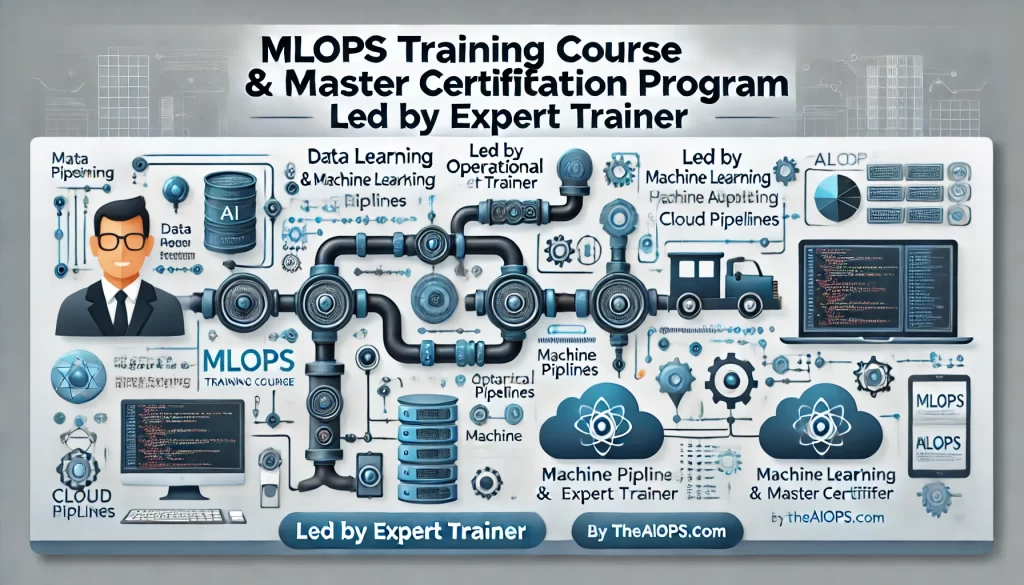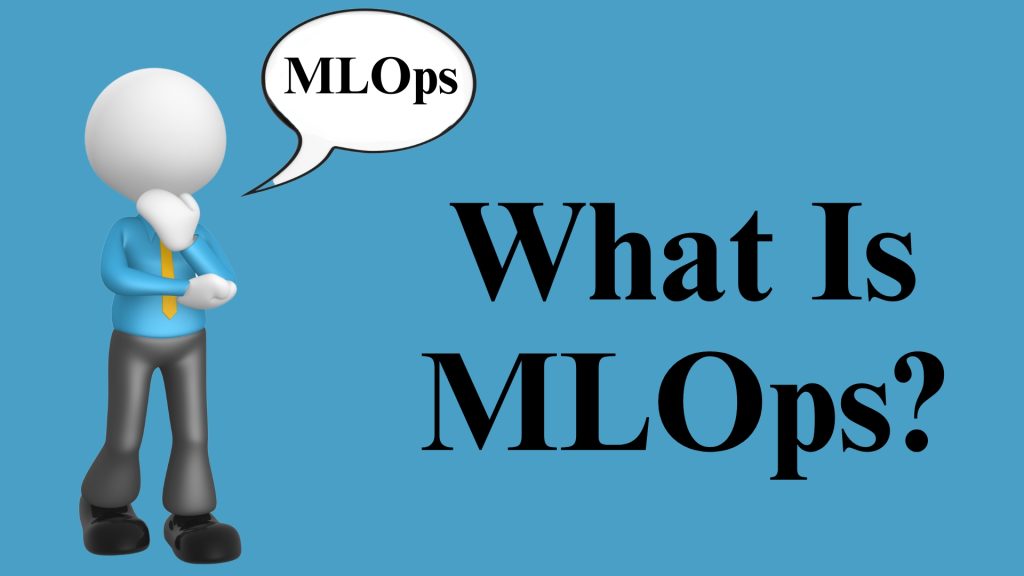
The MLOps Training Course & Master Certification Program by theaiops.com is an advanced course designed to equip data scientists, ML engineers, and IT professionals with the skills required to implement MLOps practices for efficient machine learning lifecycle management. Led by expert trainer Rajesh Kumar from RajeshKumar.xyz, this program covers essential MLOps principles, tools, and workflows to help teams deploy, monitor, and scale machine learning models in production reliably and efficiently. Participants gain hands-on experience with leading MLOps tools and techniques, learning to automate model training, manage versioning, ensure model governance, and monitor performance in real time. By the end of this training, learners are well-prepared for the MLOps Master Certification, validating their expertise in this fast-growing field. This program empowers professionals to bridge the gap between machine learning development and operations, ensuring seamless, scalable, and robust ML deployments that drive impactful results in business.
What is MLOps?

MLOps, or Machine Learning Operations, is a set of practices and tools that automate and streamline the deployment, monitoring, and management of machine learning models in production. Drawing from the principles of DevOps, MLOps bridges the gap between data science and IT operations, enabling organizations to bring machine learning models from development to production more efficiently and at scale. MLOps encompasses the entire machine learning lifecycle, from model training and validation to deployment, monitoring, and retraining. It focuses on versioning, reproducibility, and governance to ensure models are reliable, traceable, and compliant with regulatory requirements. By implementing MLOps, organizations can improve model performance, reduce deployment time, and maintain model accuracy over time, ultimately making machine learning a sustainable and impactful part of their business strategy. This approach is crucial for supporting the continuous delivery of AI solutions in dynamic, real-world environments.
Why MLOps is Important
As organizations increasingly rely on AI and machine learning to make data-driven decisions, the importance of MLOps has grown significantly. Here’s why MLOps is critical:
- Efficient Model Lifecycle Management: MLOps provides a structured approach to managing the end-to-end lifecycle of ML models, from development to deployment, monitoring, and retraining. This ensures models remain relevant and perform well over time.
- Scalability: MLOps makes it possible to deploy machine learning models at scale, allowing organizations to handle large volumes of data and run ML models in real-time production environments.
- Improved Collaboration: By bridging the gap between data science and operations, MLOps encourages cross-functional collaboration, ensuring data scientists, engineers, and IT professionals work in harmony.
- Increased Reliability and Performance: With tools for monitoring and maintenance, MLOps ensures models stay accurate and perform optimally, reducing risks associated with drift, data shifts, or performance degradation.
- Faster Time-to-Market: MLOps automates many aspects of model deployment and management, significantly reducing the time it takes to bring new models from the lab to production.
Course Features
This MLOps course offers a comprehensive learning experience designed for data scientists, ML engineers, and IT professionals looking to build, deploy, and manage ML models effectively. Course highlights include:
- Balanced Theoretical and Practical Learning: Covers MLOps fundamentals, best practices, and real-world applications, combining theoretical knowledge with practical insights.
- Hands-On Labs: Each module features guided labs and exercises that let participants gain practical experience with popular MLOps tools such as MLflow, Docker, and Kubernetes.
- Industry-Relevant Projects: Participants work through case studies and projects inspired by real-world applications, simulating challenges encountered in production ML workflows.
- Lifetime Access to Course Materials: Participants can access course resources, recorded sessions, and practical guides anytime, ensuring continuous learning.
- Expert Instruction: The course is taught by Rajesh Kumar, an experienced trainer in MLOps and DevOps, who brings practical knowledge and industry insights to every session.
Training Objectives
The primary objective of this course is to empower participants with the skills needed to manage the complete ML lifecycle in a scalable, repeatable, and reliable manner. By the end of this course, participants will be able to:
- Understand MLOps principles and apply them to manage ML models in production environments.
- Develop, test, and deploy machine learning models with tools like MLflow, Docker, and Kubernetes.
- Set up version control and CI/CD pipelines to automate the deployment and monitoring of ML models.
- Monitor model performance, detect drift, and implement retraining workflows to maintain model accuracy over time.
- Work collaboratively across data science and operations teams, implementing best practices for ML model management.
Target Audience
This course is ideal for:
- Data Scientists and ML Engineers: Professionals who want to learn best practices for deploying, managing, and scaling ML models in production.
- DevOps Engineers: Engineers looking to expand their skills to include ML workflows, CI/CD for ML, and model deployment.
- IT Operations and Cloud Engineers: Professionals responsible for managing infrastructure and deployment who want to support data science and ML initiatives.
- Data Engineers: Individuals working on data pipelines who wish to ensure that data flows support reliable ML model training and deployment.
- Business Intelligence and Analytics Professionals: Those looking to integrate machine learning into analytics pipelines, improving the accuracy and relevance of business insights.
Training Methodology
The MLOps course employs a combination of lectures, hands-on labs, and project-based learning to ensure participants gain both foundational knowledge and practical experience:
- Lecture-Based Sessions: Cover key concepts, tools, and best practices in MLOps, offering participants a deep understanding of the MLOps landscape.
- Hands-On Labs: Participants complete labs with tools like Docker, Kubernetes, and MLflow, gaining practical experience in building and managing ML pipelines.
- Interactive Q&A Sessions: Throughout the course, participants have the opportunity to ask questions and discuss challenges, enabling collaborative learning.
- Real-World Project Assignments: Case studies and projects let participants apply what they’ve learned, simulating real-world challenges in deploying and maintaining ML models.
- Assessment and Feedback: Each module includes assessments and quizzes, providing immediate feedback to gauge comprehension and ensure skill mastery.
Certification Program
Upon completing the MLOps course, participants receive a certification from DevOpsSchool.com, validating their expertise in MLOps:
- Industry-Recognized Certification: A certification that demonstrates participants’ skills in MLOps tools, practices, and end-to-end ML model management.
- Digital Badge: Participants receive a shareable digital badge that can be displayed on LinkedIn profiles and resumes, enhancing their professional credentials.
- Lifetime Verification: Certification remains valid indefinitely, allowing participants to demonstrate their proficiency to employers at any time.
Agenda of MLOps Training Program
Day 1: Introduction to MLOps and Setting Up ML Pipelines
- Overview of MLOps: Understanding the MLOps lifecycle and its importance in ML.
- Introduction to Model Experimentation: Tools for model training and tracking (MLflow, TensorFlow).
- Setting Up Version Control for ML Models: Using Git and DVC to manage and track model versions.
- Hands-On Lab: Building an ML experiment tracking workflow with MLflow.
Day 2: Model Deployment and Monitoring
- Model Deployment with Docker and Kubernetes: Containerizing models for scalable deployment.
- Introduction to CI/CD for ML: Automating the testing, deployment, and monitoring of ML models.
- Monitoring ML Models in Production: Setting up Prometheus and Grafana for model monitoring.
- Hands-On Lab: Deploying a model using Docker and Kubernetes, and configuring monitoring for real-time performance tracking.
Day 3: Automating Model Retraining and Managing Model Drift
- Understanding Model Drift: Detecting and addressing changes in data distributions.
- Building an Automated Retraining Pipeline: Using Apache Airflow to automate data processing and model retraining.
- CI/CD for Retraining Pipelines: Implementing Jenkins for automated retraining and redeployment of models.
- Hands-On Lab: Setting up an automated retraining pipeline with Airflow and Jenkins.
Lab Setup
To make the most of this course, participants will set up a robust lab environment to complete hands-on exercises:
- Required Software: Docker, Kubernetes, MLflow, Prometheus, Grafana, Jenkins, Apache Airflow, and a Python environment.
- Hardware Requirements: A laptop or desktop with at least 8GB RAM, multi-core processor, and a stable internet connection.
- Cloud Access (Optional): Participants can use cloud providers like AWS, GCP, or Azure for deployment exercises. Local setup instructions will be provided for those without cloud access.
- Detailed Setup Guide: A step-by-step guide for setting up software, ensuring participants are prepared for each lab session.
Trainers
The course is led by Rajesh Kumar, a seasoned expert in MLOps, DevOps, and data engineering. Rajesh has years of experience in building and managing ML pipelines for large-scale organizations and brings a wealth of practical knowledge to his teaching. His hands-on, project-focused approach ensures that participants gain skills that are immediately applicable in the workplace.
Frequently Asked Questions (FAQ)
- What prior knowledge do I need?
- A basic understanding of machine learning concepts and some experience with Python are recommended.
- Do I need to know Docker or Kubernetes?
- Familiarity with Docker and Kubernetes helps, but the course includes introductory labs to get you started.
- Is this course suitable for beginners in MLOps?
- Yes, this course covers foundational MLOps concepts and is suitable for newcomers to MLOps.
- What tools will I learn?
- Tools like MLflow, Docker, Kubernetes, Prometheus, and Jenkins are covered in depth.
- Will there be hands-on labs?
- Yes, each module includes hands-on labs with practical exercises using real MLOps tools.
- How does MLOps differ from DevOps?
- MLOps applies DevOps principles specifically to the machine learning lifecycle, adding considerations for data and model management.
- What types of ML models are covered?
- The course is model-agnostic, focusing on deployment and lifecycle management practices applicable to any ML model.
- How will MLOps benefit my organization?
- MLOps improves collaboration, efficiency, and reliability in deploying ML models, helping organizations realize faster time-to-market for AI initiatives.
- Are there post-course resources?
- Yes, participants receive lifetime access to course materials and updates.
- What is model drift, and why is it important?
- Model drift occurs when a model’s performance declines due to changing data patterns. Detecting and addressing drift is critical to maintaining model accuracy.
- Will I receive a certification?
- Yes, you’ll receive a DevOpsSchool.com certification upon course completion.
- Can I use my company’s cloud account for the labs?
- Yes, you can use any cloud provider, and guidance will be provided.
- Are there group projects?
- This course is primarily individual-focused but includes opportunities for discussion and collaborative Q&A.
- How much time should I expect to spend on labs?
- Each lab takes about 1-2 hours to complete, depending on your familiarity with the tools.
- Can I revisit the course content later?
- Yes, participants have lifetime access to all course materials and recorded sessions.
